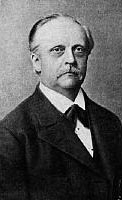Von Helmholtz, Hermann Ludwig Ferdinand
| Topics: |
Hermann Ludwig Ferdinand Von Helmholtz(1821-1894), a German physicist and physician, is best known for his extension and mathematical formulation of the law of conservation of energy (1847). He was the first to extend Joule's results to a general principle. He expressed the relationship between mechanics, heat, light, electricity, and magnetism by treating them all as manifestations of a single force: energy. He was also a pioneer in physiological optics, extending the theory of color vision, explaining the mechanism of lens accommodation in the eye, and inventing the ophthalmoscope (1851). Furthermore, he was an authority on acoustics, especially on the perception of tone quality. He was the first to determine the velocity of nerve pulses, giving the rate 30 m/s as well as the first to show that the heat released by muscular contraction is an important source of animal heat.
